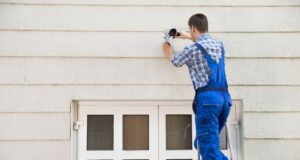What Is CCTV?
CCTV (closed-circuit television) is a system which enables you to monitor activity in and around your place of business. It receives video from security cameras placed on the site which is not publicly aired. Cameras and recorders allow you to see live events while saving material for later use. Do not confuse a CCTV monitor with standard television.
CCTV technology has existed for decades, but new developments have made it more successful at catching criminals in the act. Consider the different CCTV system components and how they interact.
Types of Security Cameras
The goal of security cameras is to record video, particularly in vulnerable or high-crime areas around your facility. You can choose from the following basic security camera options:
- Wired security cameras utilize cables to send footage and perform video surveillance; however, when the transmission range surpasses 300 meters, the signal might become weakened. Using the proper networking connections, switches, and signal boosters can aid in the resolution of this issue. Multiple cameras may be linked to a single monitor in the security room.
- Analog cameras have existed for years and continue to be the most prevalent form of CCTV camera in use today. These provide fundamental functionality and save video locally.
- IP (Internet Protocol) cameras perform the same tasks as their analog predecessors but have more capabilities. They provide crisper pictures and more versatile functions such as zooming and repositioning. They can run videos on a web browser. This lets you get alerts if your cameras detect anything unusual, such as motion at your company at 3 a.m., plus watch live footage from any computer or mobile device.
Locations for Installing Security Cameras
Rather than concentrating on a certain number of security cameras to install, evaluate which places around your property provide the best viewing ranges. While every residence is located differently, the majority have high-traffic areas which are more susceptible to intrusion. As many of these places as feasible should be covered by security cameras:
- Front, rear and side doors. Place exterior cameras above or near all entrance doors of your house. Over a third of intruders enter a residence through the front or rear entrance.
- Exterior windows. Due to their solitude, windows that do not immediately face a street may be more susceptible to break-ins. Install external cameras above these windows, or use internal cameras facing the relevant windows.
- Driveways. If an intruder approaches your home, they may skulk down your driveway or try to enter through the garage door. Placing a camera over the driveway can assist in detecting suspicious activities.
- Common spaces. If thieves break into your house, they may be motivated to check certain rooms (such as the living room and master bedroom) for valuables. Use cameras to monitor these areas.
- Stairways. Some properties include balconies or basements with stairs that lead to entrance points which criminals may use to gain access inside. Install a camera on the stairwell to monitor for any suspicious behaviour.
Security Camera Installation Tips
 Keep Cameras Elevated
Keep Cameras Elevated
When deciding where to put home security cameras, it is crucial to consider location:
- All cameras should be placed out of reach so they cannot be readily damaged or removed.
- Place outside cameras on the second floor (at least 9 feet above the ground) and keep inside cameras close to the ceiling.
- Ensure the cameras are also mounted securely. While some cameras may adhere to surfaces, it is more secure to screw them directly into a wall.
- Correct Camera Angle
Equally as important as camera placement itself is determining the optimal camera angle. If you position your home security cameras straight above windows or doors without angling them properly, you may only capture the top of the intruder’s head.
Therefore, position them a few feet away from a door or window, pointing the camera toward the entry. Don’t be afraid to display your security cameras; they deter up to two-thirds of prospective intruders.
- Consider Wi-Fi Signal Strength
If you have wireless cameras, verify your home’s wi-fi signal. Your home security cameras must have dependable access to a robust wi-fi connection to collect and transmit video. The camera may become disconnected from the home security system without a reliable internet connection. The video can become jerky or otherwise deformed if the wi-fi connection is poor.
For the best CCTV systems and installation in the Abbotsford area, visit Gregg Electric online or call us at (604) 557-4734 today.



